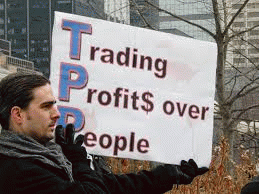Reprinted from Nation of Change
In promoting a proposed trade pact covering 12 Pacific Rim nations, President Obama has cast the initiative as an instrument of equity. The Trans-Pacific Partnership would, in his words, "level the playing field" and "give our workers a fair shot." But critics argue that within the hundreds of pages of esoteric provisions, the deal -- like similar ones before it -- includes a glaring double standard: It provides legal rights to corporations and investors that it does not extend to unions, public interest groups, and individuals.
Recently leaked drafts of the agreement show the pact includes the kind of Investor-State Dispute Settlement (ISDS) provisions written into most major trade deals passed since the North American Free Trade Agreement. Those provisions allow companies to use secretive international tribunals to sue sovereign governments for damages when those governments pass public-interest policies that threaten to cut into a corporation's profits or seize a company's property.
But also like past trade deals, the TPP is not expected to allow unions and public-interest groups to bring their own suits in the same tribunals to compel governments to enforce labor, environmental and human rights laws.
The discrepancy is a deliberate effort to make sure trade policy includes a "tilt toward giant corporations," Sen. Elizabeth Warren, D-Mass., said.
"If a Vietnamese company with U.S. operations wanted to challenge an increase in the U.S. minimum wage, it could use ISDS," Warren wrote in a Washington Post op-ed in February. "But if an American labor union believed Vietnam was allowing Vietnamese companies to pay slave wages in violation of trade commitments, the union would have to make its case in the Vietnamese courts."
The Obama administration argues that concerns from TPP opponents are exaggerated because to date the federal government has "never once lost an ISDS case."
But those opponents counter by noting that those cases are on the rise across the globe.
While trade deals include rhetoric saying the international tribunal process is not designed to undermine public interest policies, some of the cases brought by corporations have directly targeted those laws.As the United Nations reported recently, ISDS cases "have proliferated in the past 10-15 years, with the overall number of known treaty-based arbitrations reaching 514."
|
Rate It | View Ratings |
David Sirota is a full-time political journalist, best-selling author and nationally syndicated newspaper columnist living in Denver, Colorado. He blogs for Working Assets and the Denver Post's PoliticsWest website. He is a Senior Editor at In These Times magazine, which in 2006 received the Utne Independent Press Award for political coverage. His 2006 book, Hostile Takeover, was a New York Times bestseller, and is now out in paperback. He has been a guest on, among others, CNN, MSNBC, CNBC and NPR. His writing, which draws on his (more...)

OpEdNews depends upon can't survive without your help.
If you value this article and the work of OpEdNews, please either Donate or Purchase a premium membership.
If you've enjoyed this, sign up for our daily or weekly newsletter to get lots of great progressive content.
Most Popular Articles by this Author: (View All Most Popular Articles by this Author)
Tax the Corporations and the Rich or Take Draconian Cuts -- the Decision Is Ours
Bush Used the IRS, FBI, CIA and Secret Service to Go After Opponents -- Where Was the Fox and GOP Outrage?
GOP: Recession's Foreclosure Victims "Want a Homeless Life"
How the Trans-Pacific Partnership Gives Corporations Special Legal Rights
Busting myths that FDR prolonged Great Depression
To View Comments or Join the Conversation:





